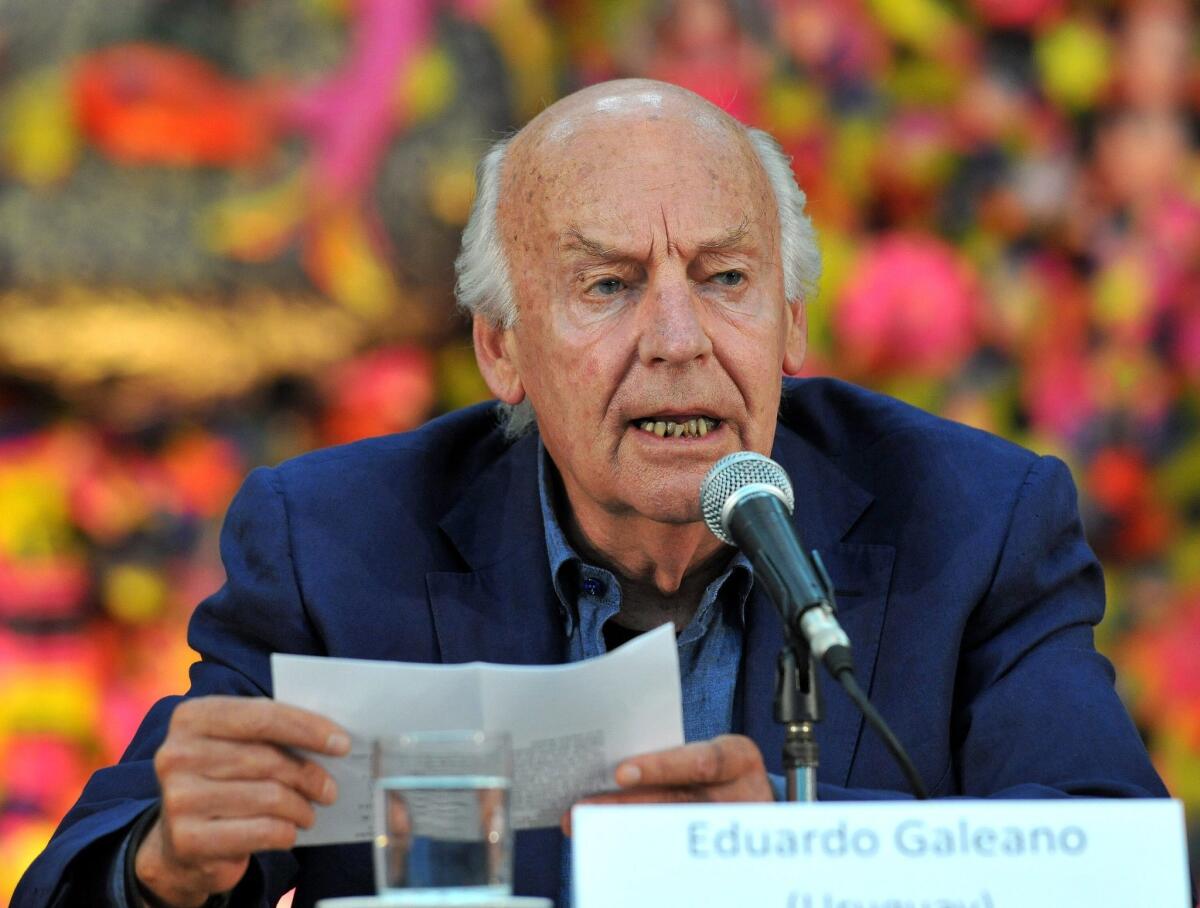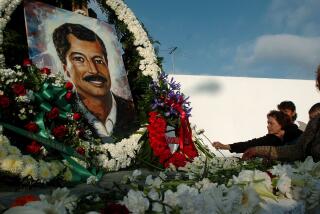Eduardo Galeano, author and journalist, dies at 74

Uruguayan author Eduardo Galeano, who wrote powerfully about the plight of the peoples of Latin America in several works, including “The Open Veins of Latin America” and the “Memory of Fire” trilogy, died April 13. He was 74.
Eduardo Galeano, the journalist and author who was born in Uruguay and wrote powerfully about the plight of Latin American peoples, died Monday. The 74-year-old had cancer.
Galeano’s major works include the 1971 book “The Open Veins of Latin America,” which became a surprise 2009 bestseller after Venezuelan President Hugo Chavez made headlines by giving a copy to President Obama, and the trilogy “Memory of Fire.” That trilogy -- “Genesis,” “Faces and Masks” and “Century of the Wind” -- told a sweeping history of the Americas in close-up vignettes. The books, which created an engaging, politically-loaded chronology of Latin America and its adjacent nations, were labeled history in some markets but sold as fiction in the United States.
“Reality is telling you beautiful things to remember and to write,” he told the Los Angeles Times in 1988, on tour for the trilogy’s concluding book. “If there is any justification for the profession of writing, it would be to help to unmask reality, to reveal the world as it is, as it was [and] as it may be if we change it.”
Galeano was born in Uruguay in 1940. He started out as a journalist in the 1960s, becoming editor of Montevideo’s daily newspaper. He published “The Open Veins of Latin America: Five Centuries of the Pillage of a Continent” in 1971. After his country’s 1973 military coup, he was forced into exile in Argentina. Political upheavals there, which included his name being added to a hit list, prompted him to move to Spain in 1976.
“I left Uruguay because I don’t like to be a prisoner,” he told The Times, “and I was obliged to leave Argentina because I don’t like to be a corpse.”
The time in Spain gave him access to the vast range of materials and historical archives that served as the starting point for “Memory of Fire.”
In a book review for The Times, Raymond A. Paredes wrote: “‘Memory of Fire’ has been a hugely ambitious project, embracing vast cultural heterogeneity and complexity. That Galeano has managed to render his history of the Americas at once accessible, coherent and fascinating is a considerable achievement.” He found the trilogy “tragic, sardonic, provocative and sharply insightful, often all at once.”
A committed leftist, Galeano told The Times in 1988: “No richness is innocent. And each freedom, each humiliation, each poverty, each horror has its own roots deep into human history. The world is organized now in such unjust ways that the rich countries think about themselves as the result of a gift from God. They were chosen by God to be rich and free.”
As for his writing style, “I was always looking for a language who could integrate everything that has been culturally divorced from, for instance, heart and mind,” Galeano told Democracy Now in 2006. “So I was looking for a feel-thinking language, sentipensante, ‘feel-thinking.’ It’s a word. I didn’t invent the word. It’s a word I heard years ago in the Colombian coast. A fisherman told me, ‘Hay gigrere en las palabras sentipensantes,’ when I told him I was a writer. “Ah, you’re a writer.” “Yes.” “Oh.” And he asked me if I was using a sentipensante language, a feel-thinking language. And so, he was a master. I mean, I learned a lot from this sentence forever. I am a sentipensante.”
The writer John Berger once said of Galeano: “To publish Eduardo Galeano is to publish the enemy: the enemy of lies, indifference, above all of forgetfulness. Thanks to him, our crimes will be remembered. His tenderness is devastating, his truthfulness furious.”
Twitter: @paperhaus
More to Read
Sign up for our Book Club newsletter
Get the latest news, events and more from the Los Angeles Times Book Club, and help us get L.A. reading and talking.
You may occasionally receive promotional content from the Los Angeles Times.







